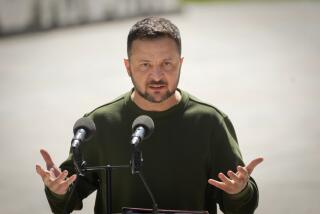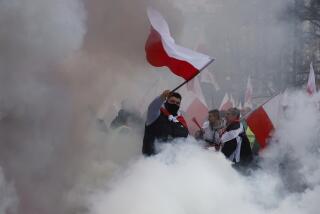Poland Cracks Down on Strikers : Roundups Started; Curfews, Summary Trials Threatened
- Share via
WARSAW — The government of Poland on Monday ordered stern action, including curfews, summary trials and police action, to stem a series of labor strikes that has spread through the country in the last week.
As a warning to strike organizers was read on national television by Gen. Czeslaw Kiszczak, the minister of interior, police in the Baltic seaport of Szczecin were rounding up strikers in three of the city’s bus depots, where workers had been on strike for four days.
Strike leaders said riot police stormed the depots in a lightning raid. “They were throwing them (the strikers) into the police vans like pigs,” said Romuald Ziolkowski, chairman of the strike committee at the Dabie bus depot in Szczecin.
Specter of ‘Anarchy’
According to Kiszczak, the strikes in 11 coal mines and nine other state-run enterprises raised the specter of “anarchy” in the country. About 400 loyalists of the banned trade union Solidarity joined the strike Monday at the Lenin Shipyard in Gdansk.
“In order to continue dialogue,” Kiszczak said, “it is necessary to interrupt illegal strikes.”
As head of the government’s Committee for the Observance of Law, Social Discipline and Order, Kiszczak said he has issued orders to:
--Increase police protection of “selected” work units.
--Ban from the premises of work enterprises all persons not connected with the business, apparently a device that would make Solidarity activists present at some strike sites liable to prosecution.
--Permit district officials in the regions surrounding Katowice, Szczecin and Gdansk to impose curfews if they see fit.
--Provide summary procedures in misdemeanor courts and for judges to impose jail terms rather than fines.
Kiszczak said he also ordered the nation’s prosecutors to “intensify” the prosecution of what he called “law and order” cases. And he said the Ministry of Defense has been given orders to provide public transportation “where it has been interrupted.”
Public Indifference
The government’s tough line--much stiffer than the approach it took during similar strikes three months ago--may be a reflection of its impression that the public is indifferent, or even hostile, to the current walkouts. It also could suggest that hard-liners in the government of Gen. Wojciech Jaruzelski have gained new strength.
After a week of renewed strike activity, the mood in the country so far does not seem any more militant that it was last spring, even though complaints about steeply rising prices--inflation is now running at more than 60%--are more common.
Kiszczak said the strikes nationwide have been carried out by a small minority of workers, whose action prevented the majority from going to their jobs.
Ripples of Coal Strike
In the coal mines around Katowice, he said, “5,000 miners are on strike, which makes it impossible for 65,000 to work.” Such a situation, he warned, “can lead to bloodshed.”
Kiszczak’s assessment of the number of strikers seemed generally accurate. Journalists in the mining region over the weekend, for example, estimated the number of strikers at the July Manifesto mine in Jastrzebie at about 500. The mine employs 9,200, including 8,400 miners.
Labor strikes in Poland are carried out by occupation of the plant grounds. Although other workers may be sympathetic with the strikers, the number of workmen occupying the work facilities is generally regarded here as an indication of the strike’s strength.
Support May Be Thin
And if that guideline is reliable, the support of the current wave of strikes here may be thin.
Although some workers at the port of Gdansk and at the Remontowa Shipyards in Gdansk also went on strike Monday, the city seemed calm and generally unexcited by the news of renewed strikes.
A 10-day strike at the Lenin Shipyard last May ended when Solidarity leader Lech Walesa and about 400 supporters failed in their demand for government recognition of the union. That strike concluded the strongest outburst of labor unrest here since 1980 and 1981 and was remarkable for its failure to generate widespread public support.
Few Rallies Held
Attempts Monday by Solidarity activists to organize strikes at half a dozen plants nationwide, including the Ursus tractor factory and the Huta Warszawa steel mill in Warsaw, generated little more than brief rallies. Police also arrested three union activists at the Ursus factory.
The strikers all have listed as their most important goal the legalization of Solidarity, banned since 1982.
Kiszczak, while not mentioning the trade union by name, said it is not possible for Poland to return to the “days of 1980 and 1981,” when Solidarity burst on the scene as the Communist Bloc’s first trade union free from government control.
There was no immediate indication that police units were preparing to storm other strike-bound enterprises, meanwhile. The authorities may have decided to move against the striking bus drivers in Szczecin because the paralyzed public transport has been preventing thousands of workers from getting to their jobs.
More to Read
Sign up for Essential California
The most important California stories and recommendations in your inbox every morning.
You may occasionally receive promotional content from the Los Angeles Times.













